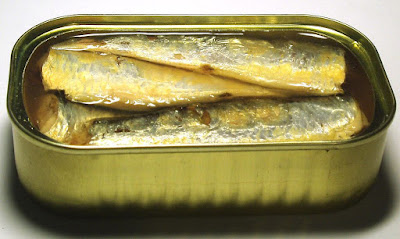A Sardine isn't actually species of fish but rather a generic name given to various small, oily fish within the herring family of Clupeidae.
The term sardine was first used in English during the early 15th century and probably came from the Italian island of Sardinia, around which sardines were once abundant.
There is sometimes confusion between sardine and pilchard. The terms "sardine" and "pilchard" do not relate to specific species, they describe ways of packing fish. The United Nations and the World Health Organisation cite 21 different species that could be classed as sardines. Moreover, no fishing organisations seem to agree on what the difference is between the two.
Sardines are legally restricted in the UK, following a court ruling of 1915 in favour of an application by a French firm, to the young of the pilchard, caught off Sardinia and Brittany.
In 1980 there were attempts to change this ruling which adversely affects packers of other small fish in the group which are indistinguishable in taste, and are now marketed as sild or brisling.
In 1824, four years after a man from Nantes, Joseph Colin, had the idea for canning sardines in oil, the world's first sardine canning factory started business there.
Sardines are typically tightly packed in a small can which is scored for easy opening – hence the popular English language saying "packed like sardines".
Sardine tins with ring-pull tops were introduced in the United Kingdom in December 1970. John West Food were the pioneers of the system, which hastened the end of the infuriating key-opener.
Canned sardines are among the few canned products which have their own retinue of connoisseurs (and vintage years).
Whilst at Downing Street, Margaret Thatcher had a cat called Wilberforce whom she doted on. She once bought him back a tin of sardines after a visit to Moscow.
The sardines of the Indo-Pacific are numerous. In the 1980s the South American pilchard, Sardinops sagax, was the most intensively fished species of sardine. Some major stocks declined rapidly in the 1990s.
Morocco is the largest canned sardine exporter in the world and the leading supplier of sardines to the European market. Sardines represent more than 62% of the Moroccan fish catch.
The King Oscar export brand of sardines was founded in 1902 and named after Oscar II who was then king of Sweden and Norway.
From May to July, billions of sardines move north along the coast of South Africa, creating a feeding frenzy.
Fresh sardines are excellent when grilled. They may also be fried, but possess plenty of oil themselves.
The chief use of sardines is for human consumption, but sardine oil has many uses, including the manufacture of paint, varnish and linoleum.
Source The Penguin Companion to Food by Alan Davidson
The term sardine was first used in English during the early 15th century and probably came from the Italian island of Sardinia, around which sardines were once abundant.
 |
| Indian oil sardine |
There is sometimes confusion between sardine and pilchard. The terms "sardine" and "pilchard" do not relate to specific species, they describe ways of packing fish. The United Nations and the World Health Organisation cite 21 different species that could be classed as sardines. Moreover, no fishing organisations seem to agree on what the difference is between the two.
Sardines are legally restricted in the UK, following a court ruling of 1915 in favour of an application by a French firm, to the young of the pilchard, caught off Sardinia and Brittany.
In 1980 there were attempts to change this ruling which adversely affects packers of other small fish in the group which are indistinguishable in taste, and are now marketed as sild or brisling.
In 1824, four years after a man from Nantes, Joseph Colin, had the idea for canning sardines in oil, the world's first sardine canning factory started business there.
Sardines are typically tightly packed in a small can which is scored for easy opening – hence the popular English language saying "packed like sardines".
 |
| Sardines packed in a tin. By Rl |
Sardine tins with ring-pull tops were introduced in the United Kingdom in December 1970. John West Food were the pioneers of the system, which hastened the end of the infuriating key-opener.
Canned sardines are among the few canned products which have their own retinue of connoisseurs (and vintage years).
Whilst at Downing Street, Margaret Thatcher had a cat called Wilberforce whom she doted on. She once bought him back a tin of sardines after a visit to Moscow.
The sardines of the Indo-Pacific are numerous. In the 1980s the South American pilchard, Sardinops sagax, was the most intensively fished species of sardine. Some major stocks declined rapidly in the 1990s.
 |
| A school of sardines in the ocean |
Morocco is the largest canned sardine exporter in the world and the leading supplier of sardines to the European market. Sardines represent more than 62% of the Moroccan fish catch.
The King Oscar export brand of sardines was founded in 1902 and named after Oscar II who was then king of Sweden and Norway.
From May to July, billions of sardines move north along the coast of South Africa, creating a feeding frenzy.
The chief use of sardines is for human consumption, but sardine oil has many uses, including the manufacture of paint, varnish and linoleum.
Source The Penguin Companion to Food by Alan Davidson

No comments:
Post a Comment